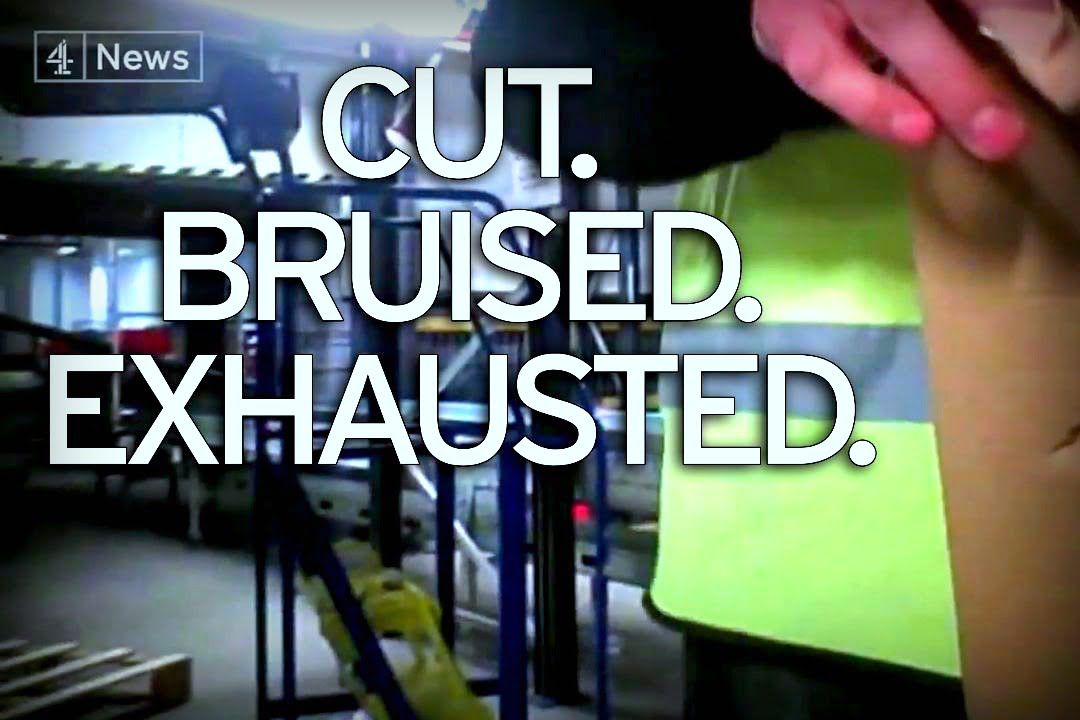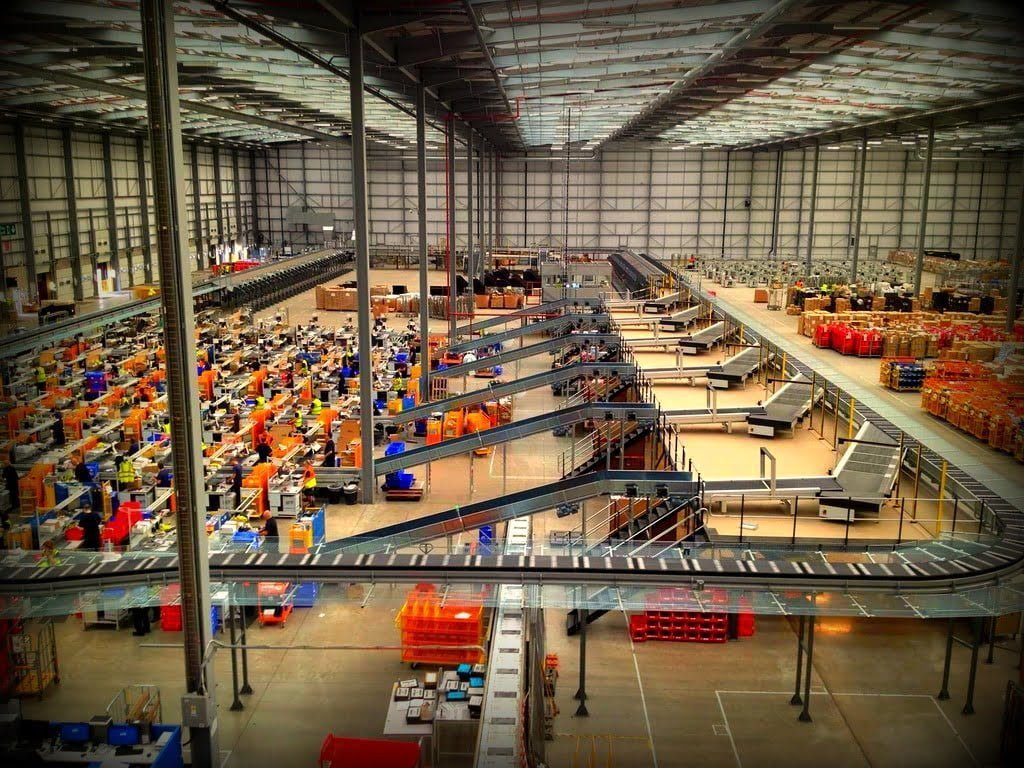It seems a week does not go by without the working conditions of warehouse workers being further exposed at what were seen as “reputable” companies. We publish here the story of a warehouse worker at ASOS, the online fashion business, who describes the super-exploitative conditions he and others face every day.
It seems a week does not go by without the working conditions of warehouse workers being further exposed at what were seen as “reputable” companies. The super-exploitative conditions facing Sports Direct workers have already been revealed recently, and even those working for the more upmarket JD sports were found to suffer terrible conditions.
Elsewhere, the workers at the ASOS warehouse in Grimethorpe, near Barnsley, were reported as also being paid poverty wages and being treated appallingly by management. The company denied many of the allegations and claimed that the trade union GMB were making inaccurate allegations. As an agency worker at the warehouse, I can confirm that the allegations are completely true and that many of the worst examples of conditions of workers have not even yet been made public.
Dictatorship in the workplace
When I took the job at the warehouse two months ago, I decided to work the night shift in order to earn a slightly higher wage (although the night hourly rate is still less than £9 an hour). The vast majority of my fellow workers also work the night shift for similar reasons, despite the obvious social problems this causes due to have a different working pattern to friends and family. The insecure nature of the work is an even greater problem for night workers, due to the difficulty in getting home by public transport if your shift is cut short for any reason.
A shift will normally last for 8 hours, with most of this time spent walking. When I took the job, we were all told that the job would involve 10-12 miles of walking per shift, although I am fairly sure this is an underestimation. The first job after arriving is to leave mobile phones and cigarettes/lighters in lockers due to these items being banned in the warehouse. This ban is strictly enforced by random security searches when leaving and the agency (Transline) office proudly displays the number of workers sacked for being found with such items in the last week.
The rules for clocking in early or late are also heavily against workers. If a worker clocks in a single minute late then Transline claim that they will dock 15 minutes pay (and almost certainly sack the worker if it happens more than once). Hypocritically, however, if a worker can’t clock out till 15 minutes after finishing time due to queuing (which has happened to me previously) then there is no extra pay.
From the second workers enter the warehouse, their every move is tracked to ensure they are putting in 100% effort to meet impossible targets. Handheld scanning devices monitor every action the workers do to ensure they are not taking breaks (apart from legally required ones). The pressure to hit these targets is intense and workers are regularly sacked for not meeting them. This leads to many workers being forced to work in an unsafe way to try to hit them. The warehouse management even then have the cheek to send memos around reminding workers that they must work safely and not just quickly!

Zero hours, zero rights
The power that the management have over the workers is also evident from the employment contracts. For agency workers, the rights the contracts give are virtually zero. Workers can be sacked at any time for no reason at no notice, and any shift can also be cancelled at no notice, or even part way through a shift, for zero pay. This creates a culture of fear and intimidation, particularly due to the completely unrealistic targets set for workers.
The position is not much better for those employed on permanent contracts. The warehouse is operated by logistics company XPO and they employ the permanent workers on so-called ‘flex’ contracts. On certain weeks, a worker on this contract can be forced to work two hours more or less for the same pay. Previously, XPO could tell a worker this on the day, but outside pressure from the GMB trade union has forced the management to give 24 hours’ notice. This still puts workers in a position where they are working extra hours and not being paid for them for up to 12 months. Refusal to do the flex hours is not a consideration due to the fact that these contracts also offer zero protection from being fired instantly.
The targets set for staff range from challenging to borderline impossible. For order picking, one of the most common jobs in the warehouse, an employee must pick 140 items per hour. While this may sound achievable, you must remember that every half hour or so the worker may need to wait for a lift to change floors and may have a significant walk between items. Many workers who I have spoken to who do this job daily have told me of constantly being told off for failing to meet the target by even a small amount.
Treated like animals
 The target-driven environment also makes it extremely difficult for staff to have the necessity of a water or toilet break during a shift. ASOS and XPO have frequently claimed that staff are always allowed to take water or toilet breaks whenever they need them. This is not technically untrue, although it seriously affects the worker’s ability to hit targets; particularly when the nearest toilet can be a 10 minute walk away from some parts of the warehouse. The further problem for staff wishing to go for a toilet break is the security searches before being allowed into the toilet. The ‘random’ searches are triggered for at least 95% of workers going to the toilet and mean that they must empty their pockets and then be subject to a search with a metal detector. This can add several minutes onto the time as there is only one security guard at each toilet and there may be several staff members waiting.
The target-driven environment also makes it extremely difficult for staff to have the necessity of a water or toilet break during a shift. ASOS and XPO have frequently claimed that staff are always allowed to take water or toilet breaks whenever they need them. This is not technically untrue, although it seriously affects the worker’s ability to hit targets; particularly when the nearest toilet can be a 10 minute walk away from some parts of the warehouse. The further problem for staff wishing to go for a toilet break is the security searches before being allowed into the toilet. The ‘random’ searches are triggered for at least 95% of workers going to the toilet and mean that they must empty their pockets and then be subject to a search with a metal detector. This can add several minutes onto the time as there is only one security guard at each toilet and there may be several staff members waiting.
This is a similar story at the end of the shift. When you have finally clocked out, which as previously mentioned could be 10-15 minutes after the shift finishing time, you must go through security, which results in some workers being selected for random searches. As part of this search, workers have to take their safety boots off and show that there is nothing in them before a metal detector search. This can add a further five minutes, all of which is unpaid. While this is far less than the stories from the Sports Direct warehouse, it is still completely unacceptable that workers are treated with such little respect and are not being paid for time that is not their own.
The location of the warehouse is also not at all surprising. The town of Barnsley suffers from high unemployment following the devastation of the coal mining industry during the 1980s. This gives unscrupulous companies such as ASOS much more power over staff, as few other jobs exist within the town. Knowing the reputation of the warehouse made me personally very cautious about taking such a job, although I had very little choice in the matter.
The cold logic of capitalism
The vast profit made by ASOS from the warehouse has been laid bare to all. ASOS reported a profit of in excess of £60 million in October, and it was reported that Chief Executive Nick Beighton “earned” more in the first two days of 2017 than us warehouse workers would in the entire year. Such ridiculous pay has been labelled “unfair” by trade union GMB, which is perhaps the understatement of the century. This completely demonstrates that the money exists to pay staff a decent and fair wage, but the fact that ASOS is a privately owned capitalist company means that they will do everything in their power to squeeze more profit from workers.
The trade union GMB has been doing excellent work to raise awareness of the conditions of the warehouse and has won some concessions, despite the warehouse management refusing to voluntarily recognise the union. As previously mentioned, XPO must now give 24 hours’ notice to flex a worker up and ASOS also paid to install a cooling system to ensure the warehouse was a bearable temperature.
This, however, should only be the start! ASOS (and all other warehouse) workers must unionise to begin the fightback against bosses who make their working conditions unbearable. All workers must be paid a real living wage and must be treated with respect. However, this is not achievable while companies such as ASOS remain privately run for the benefit of its shareholders. Only with democratically run workplaces can we put the £60 million profit into improving staff conditions and pay, to ensure that everyone is able to have a job that allows them to earn enough to live.
The high levels of unemployment within Barnsley (and the whole of the country for that matter) alongside warehouse workers having to work long shifts with few breaks is completely illogical. Yet, at the same time, it is completely logical for a private company whose sole purpose is profit. The only reason for such straining work is the system we live in. Warehouse workers must see their fight for fair conditions as the same fight by all sections of the working class against this rotten, exploitative capitalist system.






